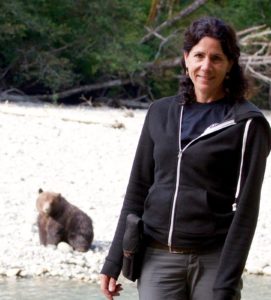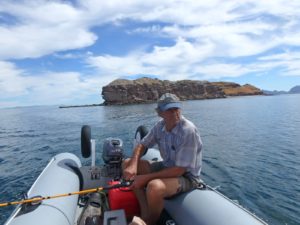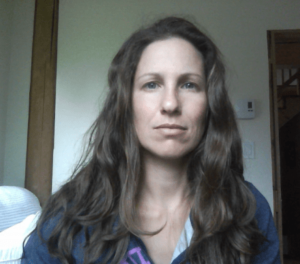Online Webinar: Getting To Know A Canadian Icon – The Grizzly Bear
Grizzly bears are a fascinating and elusive presence for us here in the Sea to Sky corridor of British Columbia. Understanding more about the grizzly bear enables us to better protect their crucial habitats and to make sure that as we continue to grow and thrive, we enable them to do the same. On June 10, 2020, we partnered with The Coast to Cascades Grizzly Bear Initiative (C2C) to gather, (virtually of course), some of BC’s leading grizzly bear researchers to share their knowledge and answer some of our favourite frequently asked questions.
Over 90 minutes, learn about grizzly bear biology, behaviours and habitats, as well as the research methods used to learn about grizzly bear populations.
To help you continue your grizzly bear education, check out this comprehensive list of resources put together by the experts, including useful how-to videos as well as research papers and conservation organizations.
Transborder Grizzly Bear Project: www.transbordergrizzlybearproject.ca
Southwest BC Grizzly Bear Project: https://www.facebook.com/BCGrizzly/
International Bear Association for Bear Research and Management: www.bearbiology.org
From Independent Research Scientists:
Dr. Bruce McLellan: https://scholar.google.ca/citations?user=zdsZOHgAAAAJ&hl=en&oi=sra
Dr. Lana Ciarniello: https://www.researchgate.net/profile/Lana_Ciarniello
Dr Michael Proctor: http://www.transbordergrizzlybearproject.ca/research/publications.html
Southwest BC Grizzly Bear Project Research: https://www.researchgate.net/project/Southwest-BC-Grizzly-Bear-Project
Coast to Cascades Grizzly Bear Initiative: www.COASTtoCASCADES.org
WildsafeBC: www.WildSafeBC.com
Get Bear Smart Society: www.bearsmart.com
WildSmart: www.wildsmart.ca
“How to properly use Bear Spray”- WildSmart (video): www.youtube.com/watch?v=VDgBY2PbnO4
“How to install Electric Fencing for bears”- Grizzly Bear Solutions (video): www.youtube.com/watch?v=lqIRMavnahE
Wildlife highway corridors : www.highwaywilding.org
U.S.Fish and Wildlife Service: www.fws.gov/mountain-prairie/es/grizzlybear.php
Coast to Cascades Grizzly Bear Initiative: www.coasttocascades.org/education-resources
Grizzly Bear Foundation: www.grizzlybearfoundation.com
Conservation Northwest: www.conservationnw.org
Bear Specialist Group: www.globalbearconservation.org
Interagency Grizzly Bear Committee (IGBC): www.igbconline.org
Friends of the North Cascades Grizzly Bear: www.northcascadesgrizzly.org
Bear Attacks: Their Causes and Avoidance- Stephen Herrero
Bears Without Fear- Kevin Van Tighem
Living in Bear Country (dvd)
Thank you to the Grizzly Bear Foundation for providing crucial support to increase the capacity of this event and make it available to all.
About the scientists:
 Dr. Lana Ciarniello is a Registered Professional Biologist, an Independent Research Scientist, and Co-Chair of the International Union for the Conservation of Nature (IUCN), Bear Specialist’s Group’s Human-Bear Conflict Expert Team. Lana began research with bears in 1993 and has provided consulting services on the research and management of fish and wildlife to the government, NGOs, First Nations, other consulting firms, and industry since 1997. Lana’s previous projects have included radio-collaring bears to track their use of habitats, survival and reproduction and using non-invasive data gathering methods to monitor the effects of bear viewing tourism on bears. She is currently the research scientist leading the new Project Rewild that aims to examine the survival of captive-reared grizzly bears. Her research interests focus on the interaction of humans and bears, particularly as they relate to resource extraction industries. Her report, Reducing human-bear conflicts: solutions through better management of non-natural foods (Ciarniello 1997) pioneered the BC Bear Smart program. Lana believes in science-based management of bears. She uses temporal and spatial modeling to seek to explain urban encroachment into bear habitat, natural food shortages, and human-bear conflicts in relation to grizzly and black bear biological requirements.
Dr. Lana Ciarniello is a Registered Professional Biologist, an Independent Research Scientist, and Co-Chair of the International Union for the Conservation of Nature (IUCN), Bear Specialist’s Group’s Human-Bear Conflict Expert Team. Lana began research with bears in 1993 and has provided consulting services on the research and management of fish and wildlife to the government, NGOs, First Nations, other consulting firms, and industry since 1997. Lana’s previous projects have included radio-collaring bears to track their use of habitats, survival and reproduction and using non-invasive data gathering methods to monitor the effects of bear viewing tourism on bears. She is currently the research scientist leading the new Project Rewild that aims to examine the survival of captive-reared grizzly bears. Her research interests focus on the interaction of humans and bears, particularly as they relate to resource extraction industries. Her report, Reducing human-bear conflicts: solutions through better management of non-natural foods (Ciarniello 1997) pioneered the BC Bear Smart program. Lana believes in science-based management of bears. She uses temporal and spatial modeling to seek to explain urban encroachment into bear habitat, natural food shortages, and human-bear conflicts in relation to grizzly and black bear biological requirements.

Dr. Bruce McLellan is a Wildlife Research Ecologist who has just begun his 43rd field season on a grizzly bear population in Southeast BC and his 15th season on another in Southwest BC, and has done research on 4 other populations as well. Over the decades he has been involved with many land-use, access management, and recreation management processes and, with others, initiated the Bear Awareness Society in the mid 1990s that now evolved into Wildsafe BC. Bruce was previously president of the International Association for Bear Research and Management, then Co-chair of the IUCN Bear Specialist Group, and now is the Redlist authority for this group. More locally, he is the guy that puts the radio collars on the bears in the Squamish to Lillooet area.

Dr. Michael Proctor is an independent research scientist that runs the Trans-border Grizzly Bear Project in southeast BC. He has been a conservation-relevant researcher since 1995 who uses genetic analyses and GPS telemetry to study landscape genetics, fragmentation, connectivity, meta-population ecology, habitat use, population dynamics, ecological and food modeling, wildlife-conflict, and publishes his work in peer-reviewed journals. He also works to implement workable conservation solutions to threatened populations. He is the deputy-chair for the IUCN Bear Specialist Group (BSG), the co-chair for the IUCN BSG Asian Brown Bear Expert Team, the past vice-president of the International Bear Association, a member of the IUCN Connectivity Conservation Specialist Group, and a former boat builder, music instrument builder, and timber framer that dabbles as a bluegrass guitar flat picker and piano player. He works internationally on several research and conservation projects and lives on the shores of Kootenay Lake in Kaslo, BC where he is happily self-isolating. His latest endeavor was to initiate Kootenay Connect, evolving from large carnivore connectivity into the broader Ecological Corridors centered on riparian-wetland complexes.

Dr. Michelle McLellan is an Independent Research Scientist and has worked on several bear research projects in BC, Alberta and Ecuador. For the last 15 years most of Michelle’s work has been focused on small and threatened grizzly bear populations in southwestern British Columbia. The goals of the Southwest BC Grizzly Bear Project are to understand the mechanisms of population change and identify opportunities for population recovery. Michelle completed her undergraduate degree in biology at McGill University and her Ph.D. in New Zealand
About Coast to Cascades Grizzly Bear Initiative:
 Coast to Cascades Grizzly Bear Initiative is a local and regional coalition united by a vision of thriving human communities and healthy, connected wildlife habitats in which grizzly bears and other species thrive. They have organized to highlight concerns around the plight of grizzly bears in the Coast to Cascades region of southwest British Columbia – a biologically and culturally rich area at the intersection of the Coast, Chilcotin, and Cascades mountains. They work closely with Indigenous and non-Indigenous communities, scientists, other conservation organizations, and provincial and local governments to protect and recover threatened grizzly bears and safeguard their habitat through science-based planning and community involvement.
Coast to Cascades Grizzly Bear Initiative is a local and regional coalition united by a vision of thriving human communities and healthy, connected wildlife habitats in which grizzly bears and other species thrive. They have organized to highlight concerns around the plight of grizzly bears in the Coast to Cascades region of southwest British Columbia – a biologically and culturally rich area at the intersection of the Coast, Chilcotin, and Cascades mountains. They work closely with Indigenous and non-Indigenous communities, scientists, other conservation organizations, and provincial and local governments to protect and recover threatened grizzly bears and safeguard their habitat through science-based planning and community involvement.







